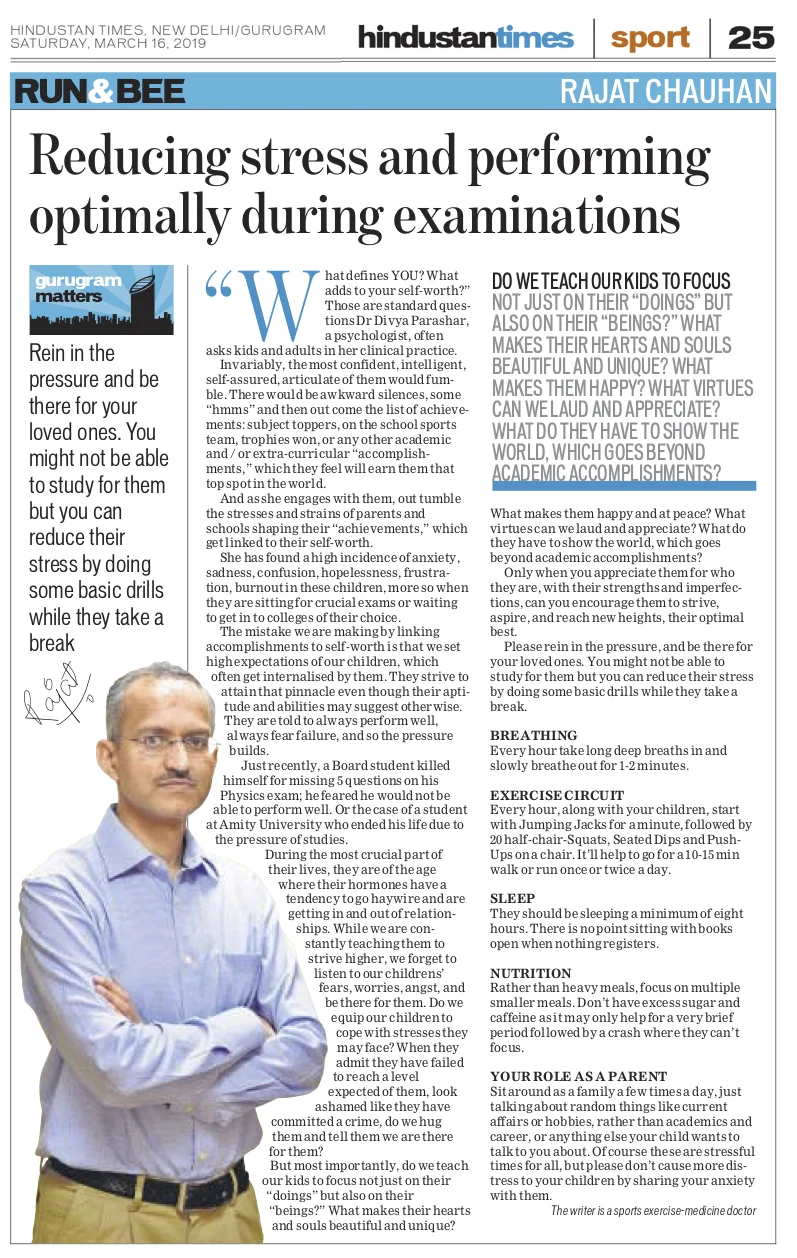Reducing stress and performing optimally during examinations
Extended version of my weekly Hindustan Times column Run&Bee: Week 42 / 16.3.2019: Reducing stress and performing optimally during examinations (co-authored with Divya Parashar)
Just last week, a three-time cycling world champion, Kelly Catlin, aged 23, doing post-graduate degree in computational and mathematical engineering at Stanford University, one of the top institutions in the world, took her own life. Her undergraduate degree was in mathematics and Chinese. Along with this she was exceptionally good at violin and arts. Only a month before on Velo News, Catlin wrote, ‘Being a graduate student, track cyclist, and professional road cyclist can instead feel like I need to time-travel to get everything done. And things still slip through the cracks.’ She went on to say, ‘but the truth is that most of the time, I don’t make everything work.’
“What defines YOU? What adds to your self-worth?” Those are standard questions Dr Divya Parashar, a psychologist, often asks kids and adults in her clinical practice.
Invariably, the most confident, intelligent, self-assured, articulate of them would fumble. There would be awkward silences, some “hmms” and then out come the list of achievements: subject toppers, on the school sports team, trophies won, or any other academic and / or extra-curricular “accomplishments,” which they feel will earn them that top spot in the world. And as she engages with them, out tumble the stresses and strains of parents and schools shaping their “achievements,” which get linked to their self-worth.
Kung Fu Panda with Boneless Baba
She has found a high incidence of anxiety, sadness, confusion, hopelessness, frustration, burn out in these children, more so when they are sitting for crucial exams or waiting to get in to colleges of their choice.
The mistake we are making by linking accomplishments to self-worth is that we set high expectations of our children, which often get internalized by them. They strive to attain that pinnacle even though their aptitude and abilities may suggest otherwise. They are told to always perform well, always fear failure, and so the pressure builds. Just recently, a Board student killed himself for missing 5 questions on his Physics exam; he feared he would not be able to perform well. Or the case of a student at Amity University who ended his life due to the pressure of studies.
During the most crucial part of their lives, they are of the age where their hormones have a tendency to go haywire and are getting in and out of relationships. While we are constantly teaching them to strive higher, we forget to listen to our childrens’ fears, worries, angst, and be there for them. Do we equip our children to cope with stresses they may face? When they admit they have failed to reach a level expected of them, look ashamed like they have committed a crime, do we hug them and tell them we are there for them?
“But most importantly, do we teach our kids to focus not just on their “doings” but also on their “beings?” What makes their hearts and souls beautiful and unique? What makes them happy and at peace? What virtues can we laud and appreciate? What do they have to show the world, which goes beyond academic accomplishments?”
It doesn’t need to be a race. You are worth a lot more than numbers of any kinds.
Only when you appreciate them for who they are, with their strengths and imperfections, can you encourage them to strive, aspire, and reach new heights, their optimal best.
“Please reign in the pressure, and be there for your loved ones. You might not be able to study for them, but you can reduce their stress by doing some basic drills along with them while they take a break.”
Breathing
Every hour take long deep breaths in and slowly breathe out for 1-2 minutes.
Break in to a Carefree Calvin and Hobbes Dance with your child a few times a day
Exercise Circuit
Every hour, along with your children, start with Jumping Jacks for a minute, followed by 20 half-chair-Squats, Seated Dips and Chair-Push-Ups. It’ll help to go for a 10-15 min walk or run once or twice a day.
Sleep
They should be sleeping a minimum of 8 hours. There is no point sitting with books open when nothing registers.
Nutrition
Rather than heavy meals, focus on multiple smaller meals. Don’t have excess sugar and caffeine as it may only help for a very brief period followed by a crash where they can’t focus.
Your role as a parent
Sit around as a family a few times a day, just talking about random things like current affairs or hobbies, rather than academics and career, or anything else your child wants to talk to you about. Of course these are stressful times for all, but please don’t cause more distress to your children by sharing your anxiety with them.




